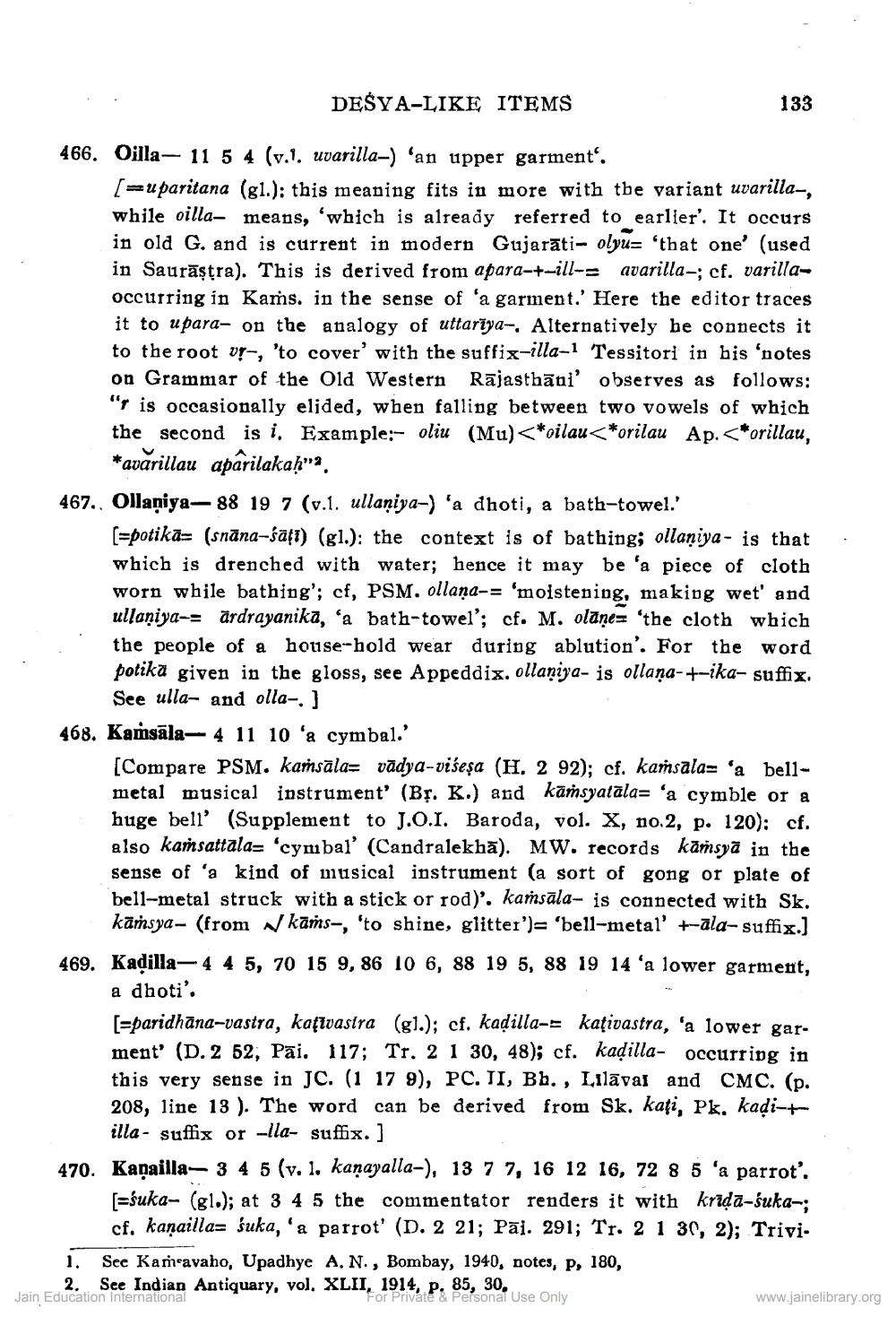________________
DESYA-LIKE ITEMS
133
466. Oilla— 11 5 4 (v.1. uvarilla-) 'an upper garment'.
[*uparitana (gl.): this meaning fits in more with the variant uvarilla-, while oilla- means, 'which is already referred to earlier'. It occurs in old G. and is current in modern Gujarāti- olyu= 'that one' (used in Saurāstra). This is derived from apara-t-ill-= avarilla-; cf. varillaoccurring in Kams. in the sense of 'a garment.' Here the editor traces it to upara- on the analogy of uttarīya-. Alternatively he connects it to the root vr-, 'to cover' with the suffix-illa-1 Tessitori in bis 'notes on Grammar of the Old Western Rajasthāni' observes as follows: ", is occasionally elided, when falling between two vowels of which the second is i. Example:- oliu (Mu) <*oilau<*orilau Ap. <*orillau,
*avarillau apârilakaḥ"a. 467.. Ollaniya-88 19 7 (v.1. ullaniya-) 'a dhoti, a bath-towel.'
[=potika- (snāna-sati) (gl.): the context is of bathing; ollaniya - is that which is drenched with water; hence it may be 'a piece of cloth worn while bathing'; cf, PSM. ollaņa-= 'moistening, making wet' and ullaniya-- ardrayanika, 'a bath-towel'; cf. M. olāne- 'the cloth which the people of a house-hold wear during ablution'. For the word potika given in the gloss, see Appeddix, ollaniya-is ollaņa-t-ika- suffix.
See ulla- and olla-.] 468. Kamsāla— 4 11 10 'a cymbal.'
[Compare PSM. kaṁsāla= vādya-višeşa (H. 2 92); cf. kamsala= 'a bellmetal musical instrument' (Br. K.) and kāṁsyatala= 'a cymble or a huge bell' (Supplement to J.O.I. Baroda, vol. X, no. 2, p. 120): cf. also kaṁsattala= 'cymbal' (Candralekhā). MW. records kāṁsya in the sense of a kind of musical instrument (a sort of gong or plate of bell-metal struck with a stick or rod)'. kaṁsāla, is connected with Sk. kārsya- (from » kāṁs-, 'to shine, glitter')= 'bell-metal' +-ala-suffix.]
469. Kadilla-4.4 5, 70 15 9, 86 10 6, 88 19 5, 88 19 14 'a lower garment,
a dhoti'. [=paridhāna-vastra, kațivastra (gl.); cf. kadilla-= kațivastra, 'a lower garment' (D.2 52, Pāi. 117; Tr. 2 1 30, 48); cf. kadilla- occurring in this very sense in JC. (1 17 9), PC. TI, Bh., Lilāval and CMC. (p. 208, line 13). The word can be derived from Sk, kați, Pk, kadi
illa - suffix or -lla- suffix. ] 470. Kapailla— 3 4 5 (v. 1. kanayalla-), 13 7 7, 16 12 16, 72 8 5 'a parrot'.
[=suka- (gl.); at 3 4 5 the commentator renders it with krida-suka-:
cf. kanailla= suka, 'a parrot' (D. 2 21; Pāi. 291; Tr. 2 1 30, 2); Trivi. 1. See Kamavaho, Upadhye A.N., Bombay, 1940, notes, P, 180,
2. See Indian Antiquary, vol. XLII, 1914, p. 85, 30, Jain Education International For Private & Personal Use Only
www.jainelibrary.org




